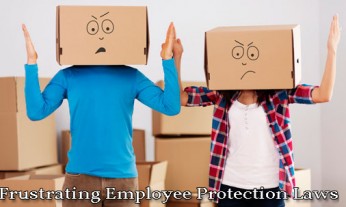 Santa Rosa labor and employment law attorney blog. Department of Labor policies on same-sex spouses and the FMLA. On February 25, 2015, the U.S. Department of Labor issued a final rule regarding the recognition of legally married same-sex couples under the Family Medical Leave Act (FMLA). It allows an eligible employee who has been legally married to a same-sex partner to use FMLA leave to care for their spouse – regardless of whether they live or work in a state that recognizes same-sex marriages. If you run a business that operates in any states that do not currently recognize same-sex marriages, it is important that you take note of this change in policy.
Santa Rosa labor and employment law attorney blog. Department of Labor policies on same-sex spouses and the FMLA. On February 25, 2015, the U.S. Department of Labor issued a final rule regarding the recognition of legally married same-sex couples under the Family Medical Leave Act (FMLA). It allows an eligible employee who has been legally married to a same-sex partner to use FMLA leave to care for their spouse – regardless of whether they live or work in a state that recognizes same-sex marriages. If you run a business that operates in any states that do not currently recognize same-sex marriages, it is important that you take note of this change in policy.
The final rule, which went into effect on March 27, 2015, is based on the Supreme Court’s decision in United States vs. Windsor. The Windsor ruling held that it was a violation of the Fifth Amendment to restrict the federal definition of marriage to include only heterosexual couples.
Prior to the Windsor ruling, employees who were covered by the FMLA were only able to take leave to care for their spouses if their marriage was recognized by the state in which they resided. As a result of the Final Rule, the current policy of the Department of Labor is based on the laws of the state in which the marriage was performed.
For example, let’s say a man was legally married to another man in California in 2014, and then he and his husband moved to Texas, where they both currently live and work. Under the old policy, if the man’s husband became ill, the man would be unable to take FMLA leave to care for him, because Texas does not currently recognize same-sex marriages. Under the new policy, the man would be eligible to take leave under the FMLA, because the laws of California (where same-sex marriages are currently recognized) would determine his eligibility, rather than the laws of Texas.
FMLA and the Rights of Same-Sex Spouses
The FMLA allows eligible employees to take 12 workweeks worth of leave during a 12-month period under the following circumstances:
- The birth of a child, and caring for a child within one year of the child’s birth;
- The placement of a child with the employee via adoption or foster care, and caring for a child within one year of the child’s placement;
- Caring for a spouse, child, or parent with a serious health condition;
- The employee having a serious health condition; or
- Any qualifying exigency arising from an employee’s spouse, child or parent being a covered military member on active duty.
The FMLA also allows 26 workweeks worth of leave in a 12-month period if an employee’s spouse, parent or child is a servicemember with a serious injury or illness.
As a result of this final rule, eligible employees who are legally married to same-sex spouses will be allowed to take FMLA leave for any of the reasons above, regardless of which state they live in. These employees are also entitled to take FMLA leave to care for their spouses’ children.
Another result of the rule is that an employee will be able to take FMLA leave to care for a same-sex spouse of their parent.
Questions About Same-Sex Spouses and Employee Leave
If you have any questions about your company’s policies on same-sex spouses and family leave, you should seek the advice of an attorney. The Beck Law P.C. Santa Rosa labor and employment law attorneys can address your concerns. You can call or email us today.





